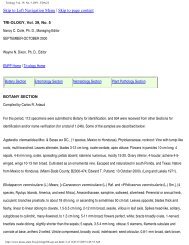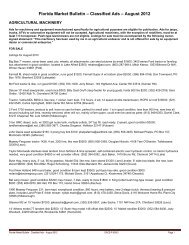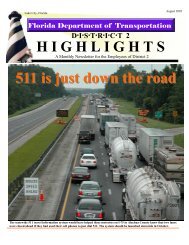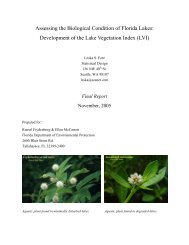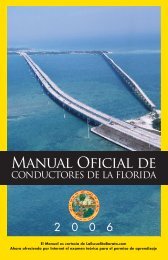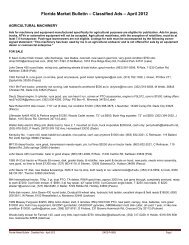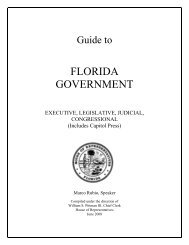Version A final setup - Florida House of Representatives
Version A final setup - Florida House of Representatives
Version A final setup - Florida House of Representatives
Create successful ePaper yourself
Turn your PDF publications into a flip-book with our unique Google optimized e-Paper software.
ARTICLE X CONSTITUTION OF THE STATE OF FLORIDA ARTICLE X<br />
amendment to any person or circumstance, is<br />
held invalid, the remainder <strong>of</strong> this amendment,<br />
including the application <strong>of</strong> such part to other<br />
persons or circumstances, shall not be affected<br />
by such a holding and shall continue in full force<br />
and effect. To this end, the parts <strong>of</strong> this amendment<br />
are severable.<br />
History.—Proposed by Initiative Petition filed with the<br />
Secretary <strong>of</strong> State August 7, 2003; adopted 2004.<br />
1 SECTION 25. Patients’ right to know<br />
about adverse medical incidents.—<br />
(a) In addition to any other similar rights<br />
provided herein or by general law, patients have<br />
a right to have access to any records made or<br />
received in the course <strong>of</strong> business by a health<br />
care facility or provider relating to any adverse<br />
medical incident.<br />
(b) In providing such access, the identity <strong>of</strong><br />
patients involved in the incidents shall not be<br />
disclosed, and any privacy restrictions imposed<br />
by federal law shall be maintained.<br />
(c) For purposes <strong>of</strong> this section, the following<br />
terms have the following meanings:<br />
(1) The phrases “health care facility” and<br />
“health care provider” have the meaning given in<br />
general law related to a patient’s rights and<br />
responsibilities.<br />
(2) The term “patient” means an individual<br />
who has sought, is seeking, is undergoing, or has<br />
undergone care or treatment in a health care<br />
facility or by a health care provider.<br />
(3) The phrase “adverse medical incident”<br />
means medical negligence, intentional misconduct,<br />
and any other act, neglect, or default <strong>of</strong> a<br />
health care facility or health care provider that<br />
caused or could have caused injury to or death <strong>of</strong><br />
a patient, including, but not limited to, those<br />
incidents that are required by state or federal law<br />
to be reported to any governmental agency or<br />
body, and incidents that are reported to or<br />
reviewed by any health care facility peer review,<br />
risk management, quality assurance, credentials,<br />
or similar committee, or any representative<br />
<strong>of</strong> any such committees.<br />
(4) The phrase “have access to any records”<br />
means, in addition to any other procedure for<br />
producing such records provided by general law,<br />
making the records available for inspection and<br />
copying upon formal or informal request by the<br />
patient or a representative <strong>of</strong> the patient, provided<br />
that current records which have been<br />
made publicly available by publication or on<br />
the Internet may be “provided” by reference to<br />
B–51<br />
the location at which the records are publicly<br />
available.<br />
History.—Proposed by Initiative Petition filed with the<br />
Secretary <strong>of</strong> State April 1, 2003; adopted 2004.<br />
1 Note.—<br />
A. This section, originally designated section 22 by Amendment<br />
No. 7, 2004, proposed by Initiative Petition filed with the<br />
Secretary <strong>of</strong> State April 1, 2003, adopted 2004, was redesignated<br />
section 25 by the editors in order to avoid confusion with section<br />
22, relating to parental notice <strong>of</strong> termination <strong>of</strong> a minor’s<br />
pregnancy, as contained in Amendment No. 1, 2004, added by<br />
H.J.R. 1, 2004, adopted 2004.<br />
B. Amendment No. 7, 2004, proposed by Initiative Petition<br />
filed with the Secretary <strong>of</strong> State April 1, 2003, adopted 2004,<br />
published “[f]ull [t]ext” consisting <strong>of</strong> a statement and purpose, the<br />
actual amendment “inserting the following new section at the end<br />
[<strong>of</strong> Art. X],” and an effective date and severability provision not<br />
specifically included in the amendment text. The effective date<br />
and severability provision reads:<br />
3) Effective Date and Severability:<br />
This amendment shall be effective on the date it is approved<br />
by the electorate. If any portion <strong>of</strong> this measure is held invalid for<br />
any reason, the remaining portion <strong>of</strong> this measure, to the fullest<br />
extent possible, shall be severed from the void portion and given<br />
the fullest possible force and application.<br />
1 SECTION 26. Prohibition <strong>of</strong> medical license<br />
after repeated medical malpractice.—<br />
(a) No person who has been found to have<br />
committed three or more incidents <strong>of</strong> medical<br />
malpractice shall be licensed or continue to be<br />
licensed by the State <strong>of</strong> <strong>Florida</strong> to provide health<br />
care services as a medical doctor.<br />
(b) For purposes <strong>of</strong> this section, the following<br />
terms have the following meanings:<br />
(1) The phrase “medical malpractice” means<br />
both the failure to practice medicine in <strong>Florida</strong><br />
with that level <strong>of</strong> care, skill, and treatment<br />
recognized in general law related to health<br />
care providers’ licensure, and any similar wrongful<br />
act, neglect, or default in other states or<br />
countries which, if committed in <strong>Florida</strong>, would<br />
have been considered medical malpractice.<br />
(2) The phrase “found to have committed”<br />
means that the malpractice has been found in a<br />
<strong>final</strong> judgment <strong>of</strong> a court <strong>of</strong> law, <strong>final</strong> administrative<br />
agency decision, or decision <strong>of</strong> binding<br />
arbitration.<br />
History.—Proposed by Initiative Petition filed with the<br />
Secretary <strong>of</strong> State April 7, 2003; adopted 2004.<br />
1 Note.—<br />
A. This section, originally designated section 20 by Amendment<br />
No. 8, 2004, proposed by Initiative Petition filed with the<br />
Secretary <strong>of</strong> State April 7, 2003, adopted 2004, was redesignated<br />
section 26 by the editors in order to avoid confusion with already<br />
existing section 20, relating to prohibiting workplace smoking.<br />
B. Amendment No. 8, 2004, proposed by Initiative Petition<br />
filed with the Secretary <strong>of</strong> State April 7, 2003, adopted 2004,<br />
published “[f]ull [t]ext” consisting <strong>of</strong> a statement and purpose, the<br />
actual amendment “inserting the following new section at the end<br />
[<strong>of</strong> Art. X],” and an effective date and severability provision not<br />
specifically included in the amendment text. The effective date<br />
and severability provision reads:<br />
c) Effective Date and Severability:<br />
This amendment shall be effective on the date it is approved<br />
by the electorate. If any portion <strong>of</strong> this measure is held invalid for<br />
any reason, the remaining portion <strong>of</strong> this measure, to the fullest<br />
extent possible, shall be severed from the void portion and given<br />
the fullest possible force and application.



